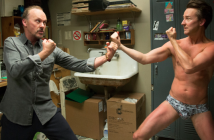
Steven Soderbergh is touching things that few dare to touch. 2001: A Space Odyssey’s legacy is such that if you haven’t seen it, odds are you can still hum the opening bars of the film’s theme “Also sprach Zarathustra”, bring to mind HAL 9000’s chilling accent and envision spaceships gliding through the blackness accompanied by classical music. These, and countless other sights and sounds, in the particular order they occur all apparently stem from Kubrick’s visual genius and Arthur C. Clarke’s ideas, and therefore 2001’s iconography is sacrosanct in the canon of film history. To recut 2001 would be to spit in the face of artistry itself, to pervert some divine artistic intention. These assumptions are what Soderbergh’s project challenges among other things. Though now taken down at the request of Warner Bros, Soderbergh’s recut of 2001 spread online like wildfire inspiring debates about creative ownership, the nature of original genius, and practical concerns such as copyright law. And, based on his notes accompanying the posting of the recut, raising a discussion was exactly his intention.
“Sometimes you have to cross the line to know where the line is. Just ask any two-year-old.” - Steven Soderbergh
Soderbergh might have originally crossed a line, however in doing so he has also redefined it, potentially for the better.
Regarding the edit itself, Soderbergh’s recutting of the film is rather interesting, and of merit on its own terms. He tightens up certain passages, completely removes others not with the only goal of cutting down the runtime, but to amplify the mystery therein. New symbolic attributes are given to HAL 9000’s relation to humanity and the beings that gift humanity their cultural progress. FilmSchoolRejects has an extremely good breakdown of the recut, which reveals that despite Soderbergh’s cuts, 2001 is still 2001. Still as debateable and ambiguous as ever, if not more so. In that case, what exactly was Soderbergh’s goal? Is he merely a copyright hypocrite based on his 2006 legal proceedings? The label isn’t so easily applied here. The context of Soderbergh’s other projects he occasionally posts on his website are important to consider when understanding what he is doing. In 2014, he recut and re-presented other classic films in the canon of cinema; for example his black and white, soundless version of Raiders of The Lost Ark draws attention to the skillful staging that can convey the film’s narrative without the need for audio.
“So I want you to watch this movie and think only about staging, how the shots are built and laid out, what the rules of movement are, what the cutting patterns are” - Steven Soderbergh
He isn’t selling these recuts, and does nothing to damage the reputation of the originals. With these posts, he demystifies the films, revealing to the audience with a new way to appreciate them. His version of Raiders is intended to be educational, to show to the viewer the conscious thought process behind every shot, making the normally unspoken open to analysis.

With his 2001 recut, Soderbergh raises an important question about the formal aspects of editing films: why is that particular version of a sequence of images the best version? Ultimately, he hasn’t improved 2001, which is something he never claimed he could do, merely he wishes to reinterpret it and raise numerous questions that needed asking. 2001 is a useful cultural monolith for this. By recutting it in such a public manner, he has opened the channels of discussion so that we can better find the boundaries of what is and isn’t acceptable artistic manipulation, legacy preservation and moral, fair copyright practice.
The answers might not be immediately forthcoming, but the discourse is important. Despite his humorous self description as William De Rijk, famous art vandal on his website’s post, the respect that Soderbergh holds for 2001 is evident in what he writes on his website.
“maybe I was too scared to touch it until now, because not only does the film not need my—or anyone else’s—help, but if it’s not THE most impressively imagined and sustained piece of visual art created in the 20th century, then it’s tied for first. meaning IF I was finally going to touch it, I’d better have a bigger idea than just trimming or re-scoring.” - Steven Soderbergh
Now that he has crossed the line and taken a knife to the canvas as De Rijk did to Rembrandt’s Night Watch, it transpires that nothing bad has actually come about. Instead of ruining a classic, Soderbergh just wants us to look at films again. Not to destroy our respect for them, but to appreciate them in a more realistic way. By touching 2001, he has actually contributed to the film’s cultural relevancy of by redefining its successes into something achievable and touchable, a human creation. 2001 is important. But it is only a film. Other films have happened since, and will continue to do so. They can be inspired by 2001, but not reducible to it. 2001 is allowed to become a motivator for new artists, rather than some untouchable standard. To me, this is the real value of Soderbergh’s recut.



